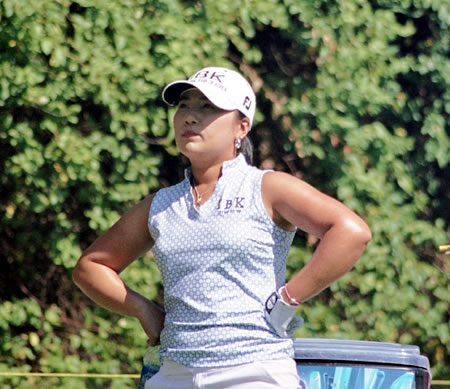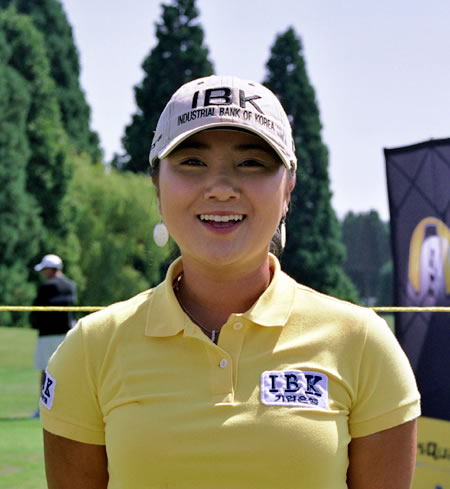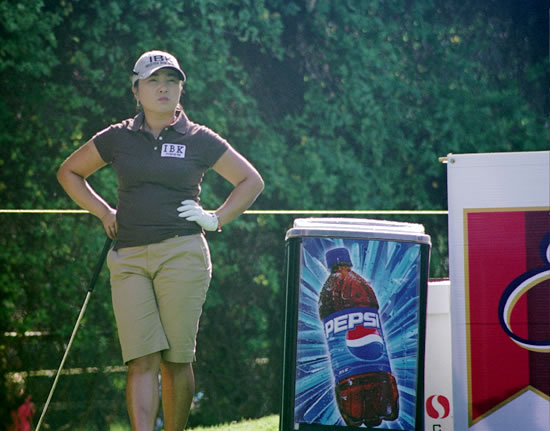 |
 |
 |
 |
 |
 |
Jeong Jang Interview
 SS:
So, what is your work routine like? How do you work when you're not at
tournaments? What's your day like?
SS:
So, what is your work routine like? How do you work when you're not at
tournaments? What's your day like?
JJ: I like to warm up in the morning, around seven if I'm up that
early, and go run outside half an hour, and I like to stretch more when
I'm not playing. And I like to work on my short game, putting… And
not really practice around lunchtime, like twelve o'clock to three o'clock…
Because I know the sun (is) really really hot (at that time). So I have
a lot of time off around lunch time. I like to practice early morning
or late afternoon. I like to do a lot of short game; I like to work on
that. I hit it farther than two years ago, because I just started my workout
(regimen) with a trainer. It's been two years; really hurts. But I hit
it at least fifteen yards farther than I did two years ago.
SS: What kind of workouts do you do?
JJ: Weight training.
SS: Legs, or arms, or…?
JJ: Everything! Uh huh. Arms and legs and… before, just by
myself, it didn't help (to do weight training). My trainer knows more
than me, so we work out together. It's been two years.
SS: Ah, that's interesting…
JJ: Her name is Andrea.
SS: What do you think she does that's different, or is it just
that she's there (to watch you)?
JJ: I think she knows what kind of muscles I needed, and she knows
when I need it. She knows how much I need (to strengthen a given muscle
group). I don't even know what she knows. She knows what part of my body
is tight, so that really helps (too).
 SS:
I notice that when you play, your father sometimes follows behind you
writing a lot of stuff; is he keeping statistics?
SS:
I notice that when you play, your father sometimes follows behind you
writing a lot of stuff; is he keeping statistics?
JJ: He's still doing it. And he's doing it to tell me at the end
of the year, what part of my game is good. So…
SS: What part is good?
JJ: He says my driver, keeping it (in) the fairway. And he says
(the) bad thing is my short game. Sometimes, if I miss the green, I'm
really bad (to get it) up and down. That's why he likes to keep stats
(laughs).
SS: How detailed is he? Does he say, 'well, if you have to chip
from deep rough you're bad, but…'
JJ: No, he doesn't say that. He says, if I hit a fairway, it's
pretty <inaudible>. He knows what kind of ball I hit, a slice, a
hook, whatever…
SS: Ah, OK.
JJ: And the second shot, he has a picture of the green on the paper,
and (there's something) pointing where the pin position (is), is the green
pretty fast, where I landed, putting (how I putted on that green)…
SS: Does it help to know that information?
JJ: The first couple of years when he did that, I was like, 'whatever,
dad!'
SS: (laughs)
JJ: When I'm done (with my round), when I go home, I don't want
to see that! OK, he just kept doing it and kept doing it, and I'm like,
'OK!', and a couple years later, he produced that graph at the end of
the year… And I was surprised to see that, I was like, 'Wow'.
SS: Tell me a little about Operation Smile [JJ is a spokesperson
for Operation Smile, a charity that performs operations on impoverished
children in developing countries who have facial deformities].
JJ: Operation Smile is awesome. I like to have a really good smile.
I like to smile all of the time. Especially when I (first) came here,
and I didn't really speak English (well), I just decided I wanted to smile…
(laughs). Sometimes I'm trying to speak English, and they don't understand,
and I'm really, really disappointed. It was a bad feeling. I don't know
if you know that feeling or not?
SS: Yeah, I do.
JJ: I just want to smile (in that case)[because everyone understands
a smile!]. I was looking at that Operation Smile, that (brochure), and
the kids, they can't smile, and they don't even have friends! I was like,
wow! That's really sad! That really made me… I really wanted to help
them. Then after (the operation) they can smile! After the doctors…
SS: So you contacted them, or they contacted you?
JJ: I contacted them. I really wanted to help them. Then after
that, (the kids) can have a big smile!
SS: That's great.
JJ: You don't really need big money. For only around $300 I can
fix one kid. One month. That's not really hard. So I help twelve kids
a year.
 SS:
That's really great!... Just a few more questions. So, do the younger
Korean players come up to you, and look at you as their onni, try to get
advice?
SS:
That's really great!... Just a few more questions. So, do the younger
Korean players come up to you, and look at you as their onni, try to get
advice?
JJ: Ummm….
SS: Do you try to do that with them, or do you just leave them
alone?
JJ: Half and half. I really want to try and help them most of the
time… And some of the time they come up to me and ask something,
and I really want to help if someone asks, 'help!' But most of the kids
don't really want it. I'm waiting and waiting. Most of them travel with
family. If they really want to do that, they can try to find someone.
If somebody asks me, I really want to help them, because I really had
a hard time when I came here! (laughs)
SS: It's interesting that they don't take you up on that…
OK, one more question. I've noticed that you do pretty well in Majors,
especially the US Women's Open and the British Open. Why do you think
that particular type of course (is good for you)?
JJ: I think it's a fair course. Some golf courses (are) not really
fair.
SS: In what way?
JJ: Some courses are really wide, and (have) big greens, but I
like tight courses and small greens. And most of the Majors are really
tight and long, and have small greens. I think that's kind of fair, because
I can't hit it far, but I can hit it straight. So I think that's kind
of good for me, and I think that's why I play better! (laughs) And big
purse! (laughs)
SS: Yeah, that's a motivation, isn't it? Well, that's pretty much
all I have, thank you!